Fasting and Erectile Dysfunction: Does It Help or Harm your Sexual Health?
Written by Dr. Deepali Anand

Dr. Deepali is a medical writer and healthcare professional with a background in clinical surgery and patient care. Having transitioned from active clinical practice to medical communications, she specializes in bridging the gap between complex clinical data and patient education. Dr. Deepali is dedicated to creating evidence-based content that is grounded in scientific rigor and empathy, ensuring that sensitive topics like sexual wellness and mental health are accessible and empowering for every reader.
•
September 18, 2025
Our experts continually monitor the health and wellness space, and we update our articles when new information becomes available.

Quick Read
For most men, fasting itself doesn't cause erectile dysfunction and is unlikely to create permanent erection problems. Moderate intermittent fasting (like 16:8) may actually improve sexual health by supporting weight loss, better blood flow, and hormonal balance, especially for overweight men. However, extreme or prolonged fasting can temporarily affect sexual performance through nutrient deficiencies, stress, and hormonal disruption. The key is finding a balanced fasting approach that works for your body while maintaining proper nutrition, hydration, and overall health. If you're experiencing persistent erectile issues during fasting, consult a healthcare provider to ensure your approach is right for you.
Can fasting cause erectile dysfunction? For most men, the answer is no, fasting itself doesn’t directly cause permanent erection problems. That said, the story isn’t so simple.
Depending on how long you fast, your body type, and your overall health, fasting can sometimes bring short-term changes in erections, sex drive, energy, or hormone levels. The good news is that, when done properly, fasting may actually improve factors like blood flow, testosterone, and weight, all of which are crucial for sexual health.
In this article, we’ll break down how fasting affects erections, hormones, and libido, explore both the benefits and risks, and share practical tips to keep your sexual health on track while fasting.
Can Fasting Cause Erectile Dysfunction?
No, fasting itself does not cause erectile dysfunction. It doesn’t cause permanent erectile dysfunction, though in some cases, certain types of fasting may temporarily affect sexual performance.
The connection between fasting and erectile dysfunction is a bit complex. It depends on several factors,such as the type of fasting (intermittent vs. prolonged), how long you fast, your overall health, and even your body composition.
Research shows fasting can influence erections in both positive and negative ways. Some men may notice temporary changes in sex drive or function, while others may see improvements. Overall, the evidence suggests that fasting does not have a harmful long-term effect on erectile function.
According to Allo Health, nearly 1 in 2 men experience erectile dysfunction, which is based on our internal clinical data of more than 2.5 lakh patients who have visited our clinics.
Allo asks
Have you noticed any changes in your sexual health while fasting?
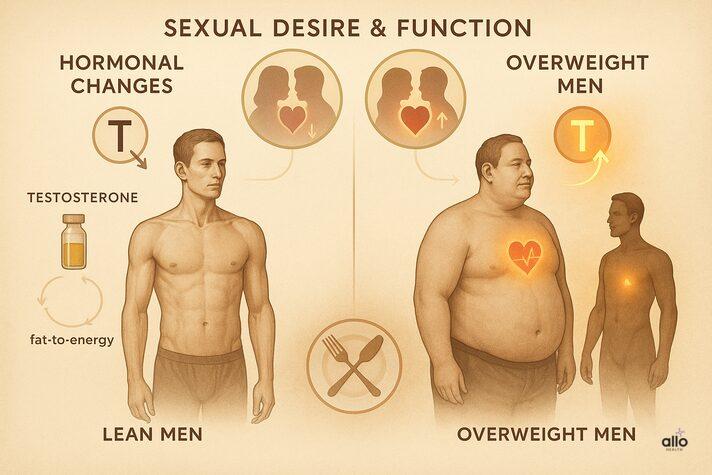
How Fasting Affects Erections
Fasting and Hormonal Changes
Fasting can influence hormone[1] health differently depending on the individual.
- In healthy, lean men, intermittent fasting has been shown in some studies to reduce testosterone levels. Lower testosterone can affect metabolic health, energy, and libido.
- In overweight or obese men, however, fasting may actually increase testosterone. This happens because calorie restriction improves testicular function and reduces the conversion of testosterone into estrogen (estradiol) by excess body fat.
Fasting and the weight loss that often comes with it can also improve insulin sensitivity and lower inflammation. Since obesity, insulin resistance, and chronic inflammation are all risk factors for erectile dysfunction, fasting can sometimes help improve sexual health in these cases.
Sexual Desire and Function Changes
Research also suggests that fasting can impact sex drive in different ways:
- One study[2] on Ramadan intermittent fasting found it was associated with a decrease in sexual desire, frequency of sex, and FSH (follicle-stimulating hormone) levels.
- On the other hand, other studies report the opposite effect. One study[3] found that men who practiced intermittent fasting were actually less likely to experience erectile dysfunction. Researchers suggest this protective effect may be linked to improved metabolic health.
Think of fasting as a tool. If done correctly, it can support your overall health, but if overdone or poorly managed, it might harm your energy levels and libido.
Fasting and Sex Drive: What Happens in Your Body While Fasting
Fasting, whether short-term or long-term, changes how your body manages energy and hormones. Blood sugar drops, insulin works more efficiently, and fat is burned for fuel through lipolysis. These shifts improve weight control, circulation, and blood vessel health, all of which can influence sex drive.
A 2025 animal study[4] found that long-term intermittent fasting increased sex drive in older males by lowering brain serotonin, a mechanism that may also apply to humans.
Still, the effects aren’t the same for everyone. Moderate intermittent fasting may support metabolism and libido, especially in overweight men, while prolonged or extreme fasting often harms sex hormones and sexual function.
The key is balance, enough fasting to gain health benefits without stressing or depleting the body.
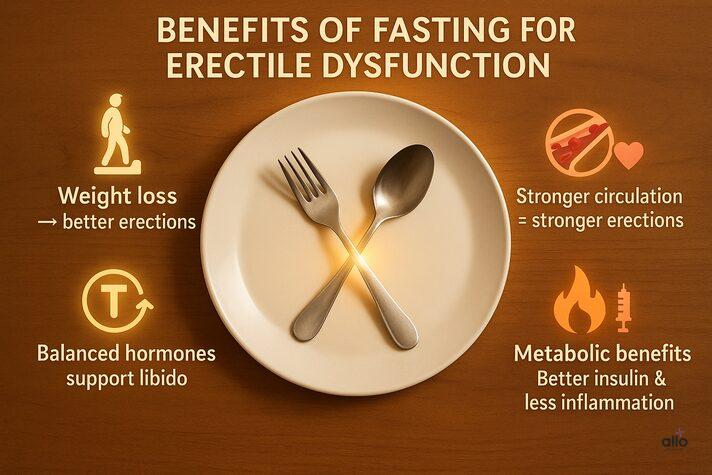
Benefits of Fasting for Erectile Dysfunction
Now that we understand how fasting affects the body and sexual health, let’s look at some of the potential benefits it can offer for men dealing with erectile dysfunction (ED).
Weight Loss and Metabolic Improvements
For overweight and obese men, moderate calorie restriction or intermittent fasting can improve erectile function by:
- Enhancing insulin sensitivity
- Reducing inflammation
- Supporting heart and vascular health
- Improving testosterone production
Even a modest weight loss of 5-10% can make a noticeable difference in erectile function, sexual desire, and testosterone levels.[5]
Improved Blood Flow
Fasting has been linked to better cardiovascular health, which in turn supports stronger blood flow. Since erections depend heavily on good circulation, improvements in vascular function can have a direct positive effect.
Hormonal Balance
Short bouts of fasting may boost testosterone levels in some men, especially those who are overweight or obese. Testosterone plays a central role in sexual function, from libido to erectile strength.
Fasting can also:
- Increase insulin sensitivity
- Help manage insulin resistance
- Lower inflammation in the body
All of these changes together can support better sexual health.
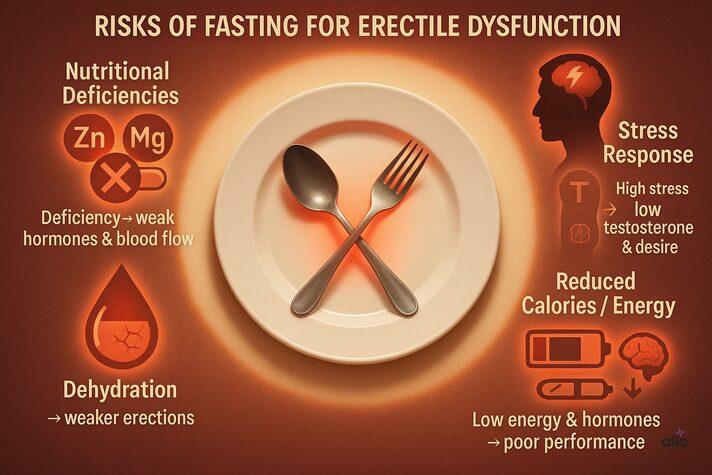
Risk of Fasting for Erectile Dysfunction
While fasting has benefits, it’s not without risks. Extreme or poorly managed fasting can actually work against sexual health.
Nutritional Deficiencies
Prolonged or restrictive fasting can cause deficiencies in nutrients like zinc, magnesium, and L-arginine, all of which are important for testosterone production, blood flow, and overall sexual function.
Stress Response
Extended fasting may increase levels of cortisol (the body’s main stress hormone). High cortisol can lower testosterone, reduce sexual desire, and even contribute to performance anxiety. The mental strain of severe dietary restriction itself can also affect erections.
Dehydration and Reduced Calorie Intake
Fasting sometimes leads to dehydration, which affects blood circulation- a key factor in getting and maintaining an erection. Very low calorie intake can also create challenges[6]:
- Blood sugar instability: Prolonged fasting may cause hypoglycemia (low blood glucose levels), which interferes with nerve function needed for arousal.
- Neurotransmitter disruption: Extended fasting can reduce dopamine, a brain chemical essential for desire and arousal.
- Energy depletion: Too few calories means the body has less energy available for sexual function.
Over time, severe calorie restriction can lower total and free testosterone while raising sex hormone–binding globulin (SHBG), which reduces the availability of testosterone in the body.[7] This hormonal shift can weaken libido and impair erectile function.
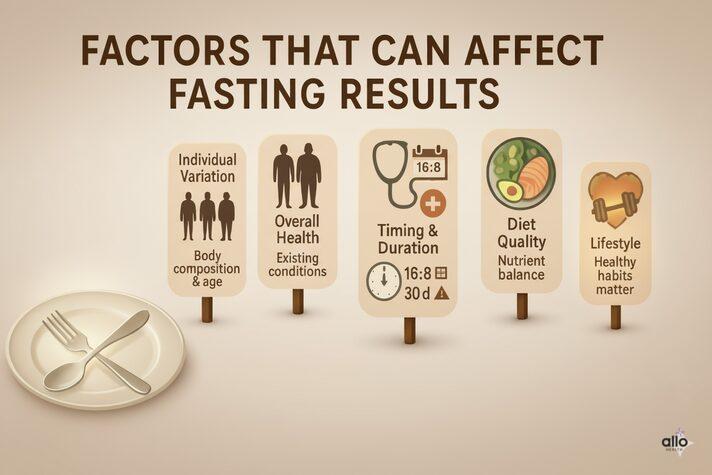
Factors That Affect How Your Body Responds to Fasting
Not everyone experiences fasting in the same way. How fasting influences erectile function depends on several individual and lifestyle factors.
Individual Variation
The impact of fasting can differ widely from one person to another. Key factors include:
- Starting body weight and composition
- Age and baseline testosterone levels
- Type and duration of the fasting protocol
- Overall health status and underlying conditions
These differences explain why fasting may improve sexual health for some men while creating challenges for others.
Timing and Duration Matter
Short-term intermittent fasting (12–16 hours) is generally less likely to affect erectile function compared to prolonged or extreme fasting.[8] Very low-calorie diets followed over several weeks or months carry higher risks of sexual dysfunction.
Quality of Diet During Eating Periods
What you eat outside of fasting hours matters as much as the fasting itself. A nutrient-dense diet rich in vitamins, minerals, lean proteins, and healthy fats supports hormone production, blood flow, and sexual health. Poor nutrition during eating windows can cancel out the potential benefits of fasting.[9]
Overall Health and Lifestyle
Fasting is most effective when it’s part of a healthy lifestyle that also includes balanced eating, regular physical activity, and stress management. These habits, together, play a powerful role in supporting erectile function and overall sexual well-being.
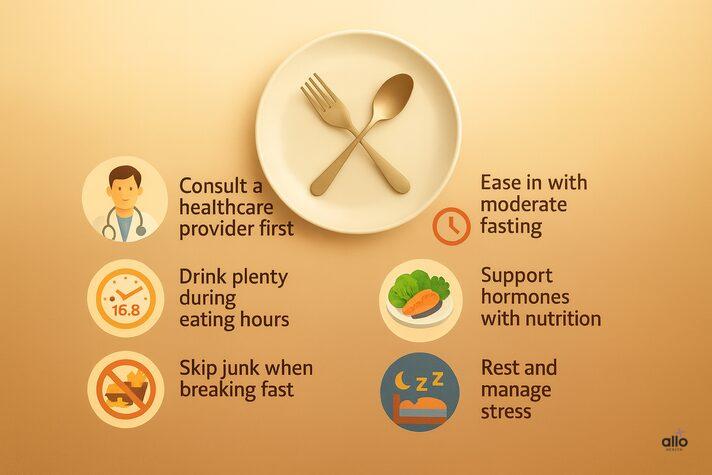
Practical Tips for Men Who Fast and Want to Maintain Sexual Health
- Consult a healthcare provider before beginning any fasting routine, especially if you already have sexual health concerns.
- Start gradually. If you’re new to fasting, try moderate intermittent fasting approaches such as the 16:8 method (16 hours fasting, 8 hours eating) to see how your body responds.
- Stay well-hydrated during non-fasting hours to support circulation and energy levels.
- Choose nutrient-dense foods. Focus on proteins, leafy greens, healthy fats, zinc, and vitamin D, all of which play a role in hormone production and sexual health.
- Avoid junk foods when breaking your fast, as they can offset the metabolic benefits.
- Prioritize sleep and stress management, since both are crucial for hormone balance and erectile function.
- Incorporate gentle exercise such as walking or light workouts to keep blood flow healthy.
- Seek medical advice if erectile dysfunction continues beyond the fasting period.
Bottom Line: Can Fasting Cause Erectile Dysfunction or Help it?
Moderate intermittent fasting can support sexual health and even improve erectile function, particularly in men who are overweight or dealing with metabolic issues. By improving insulin sensitivity, reducing inflammation, and supporting weight loss, fasting often helps more than it harms.
That said, extreme or prolonged fasting can backfire, leading to nutrient deficiencies, hormonal imbalances, or stress-related sexual problems.
The key is to find a balanced approach that works for your body, supports overall health, and protects your sexual well-being.
Disclaimer
The following blog article provides general information and insights on various topics. However, it is important to note that the information presented is not intended as professional advice in any specific field or area. The content of this blog is for general educational and informational purposes only. The content should not be interpreted as endorsement, recommendation, or guarantee of any product, service, or information mentioned. Readers are solely responsible for the decisions and actions they take based on the information provided in this blog. It is essential to exercise individual judgment, critical thinking, and personal responsibility when applying or implementing any information or suggestions discussed in the blog.
Most Asked Questions
Can starving cause erectile dysfunction?
Yes, prolonged starvation or extreme calorie restriction can increase stress hormones, lower testosterone, and cause nutrient deficiencies, all of which may lead to erectile dysfunction. Moderate, well-planned fasting is different from starving and is less likely to cause these issues.
Can fasting lower sex drive?
It depends. Short-term fasting may temporarily reduce sex drive due to energy dips or stress. But for many men, especially those who are overweight, fasting can improve metabolism, hormones, and blood flow, which may actually boost sex drive over time.
Does salt help erectile dysfunction?
No, adding more salt to your diet won’t treat ED. In fact, too much salt can harm blood pressure and circulation, which are crucial for erections. Instead, focus on a balanced diet rich in nutrients like zinc, vitamin D, and healthy fats.
Is intermittent fasting good for erectile dysfunction?
For some men, yes. Intermittent fasting can improve insulin sensitivity, reduce inflammation, and support healthy testosterone levels, especially in overweight individuals. But extreme or prolonged fasting can backfire, so balance is key.
Can erectile dysfunction be treated?
Yes. ED is often treatable with lifestyle changes, medical treatment, counseling, or a combination of these. If erectile problems persist even after improving diet and lifestyle, it’s best to consult a healthcare provider for proper evaluation and treatment options.
Sources
- 1.
Effect of Intermittent Fasting on Reproductive Hormone Levels in Females and Males: A Review of Human Trials
- 2.
The effect of fasting on erectile function and sexual desire on men in the month of Ramadan
- 3.
Organic Diet and Intermittent Fasting are Associated With Improved Erectile Function
- 4.
Intermittent fasting boosts sexual behavior by limiting the central availability of tryptophan and serotonin
- 5.
Effects of a low-energy diet on sexual function and lower urinary tract symptoms in obese men
- 6.
Long-term effects of calorie restriction on serum sex hormone concentrations in men
- 7.
Long-Term Effects of a Randomised Controlled Trial Comparing High Protein or High Carbohydrate Weight Loss Diets on Testosterone, SHBG, Erectile and Urinary Function in Overweight and Obese Men
- 8.
Long-term effects of calorie restriction on serum sex hormone concentrations in men
- 9.
Eat To Perform: Foods That Can Help With ED


